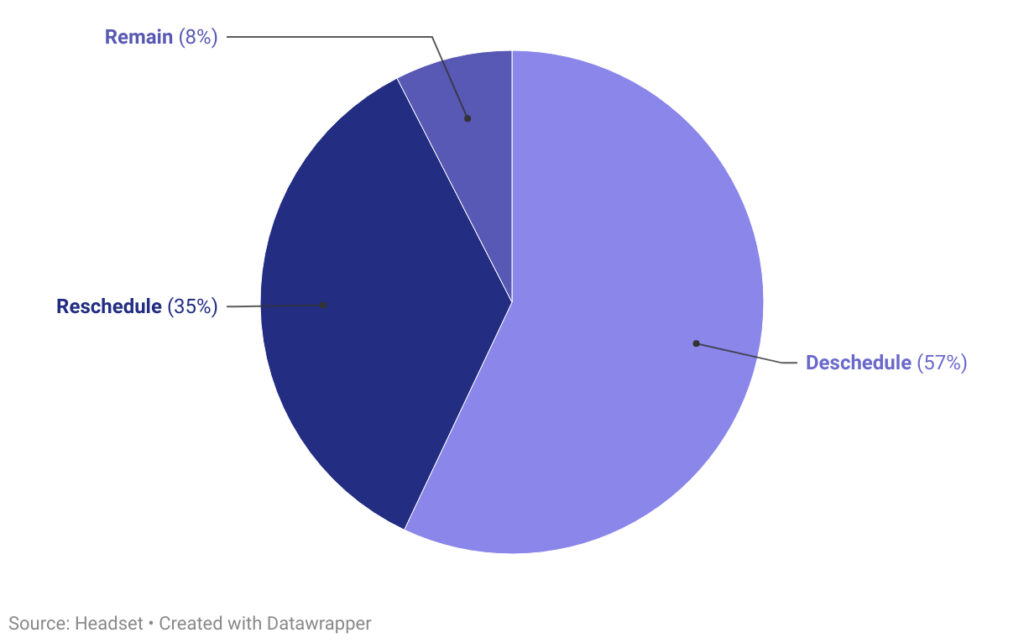DEA's Call For Public Input On Cannabis

Public Comments Overwhelmingly Favor Cannabis Descheduling in Federal Review.
The deadline for public comments on the federal government’s plan to reclassify cannabis from Schedule I to Schedule III of the Controlled Substances Act (CSA) concluded on July 22 with tens of thousands of statements. Overall sentiment? Positive for marijuana supporters.
Cannabis-focused provider of data and analytics Headset in collaboration with Poseidon Investment Management issued a report Tuesday revealing that about 35% of comments submitted to the Drug Enforcement Administration (DEA) supported rescheduling. More importantly, a bigger percentage,, or some 57% expressed support for full marijuana descheduling.
Headset Report Key Takeaways
The DEA’s call for public input on cannabis rescheduling garnered an impressive response, with over 42,000 comments submitted. To put this into perspective, that’s roughly equivalent to the entire population of Juneau, the capital city of Alaska, reads the report.
Just the level of engagement speaks volumes of how important the cannabis rescheduling question is for the American people.
The results couldn't be clearer – the majority of comments express dissatisfaction with the current marijuana laws. Specifically, 92.45% of comments favored changing cannabis’s schedule, while only 7.55% opposed any change. This indicates that 9 out of 10 individuals who commented believe that cannabis should not remain a Schedule I substance. Among those supporting a change, 61.7% advocated for complete descheduling of the plant, while 38.3% favored rescheduling to a less restrictive category.

This data mirrors findings from another analysis by the Drug Policy Alliance (DPA), which revealed that nearly 70% of rescheduling proposals endorse federal cannabis decriminalization.
Rescheduling Vs. Deschedling
As a Schedule I substance, cannabis is classified alongside heroin, LSD, methamphetamine, and ecstasy, indicating it is deemed to have no accepted medical value and a high potential for abuse. Moving it to Schedule III would place it alongside substances like ketamine, anabolic steroids, and testosterone, signaling that the federal government no longer views it as a risky substance.
Although cannabis would remain a controlled substance, rescheduling would reduce the obstacles faced by businesses and consumers. “The most important benefit for weed businesses would be tax relief regarding the issue of the IRS code 280E, which prohibits the marijuana industry from taking federal deductions,” Michael Rosenblum, partner at Thompson Coburn LLP previously told Benzinga.
Rescheduling cannabis could add 55,500 jobs by 2030, according to an economic analysis done by the MCBA and Whitney Economics.
Descheduling, however, would accomplish all this and more – it would enable comprehensive cannabis justice reform.
In conclusion, the majority of individuals or groups that commented do not view marijuana as a substance that should remain federally controlled.
Critical Time
These results come at a critical time, with President Joe Biden announcing his decision to drop out of the presidential race; it was his administration that proposed the rescheduling process. To keep on its promises, the Biden administration should conclude the process before Inauguration Day (Jan. 20, 2025).
However, this task may prove challenging, as analyst Pablo Zuanic points out, projecting potential delays if the DEA must address the large volume of comments received. Alternatively, Zuanic suggests the DOJ might expedite the process by forgoing hearings and directly moving to finalize the rule. Despite this option, hearings will likely be held, lengthening the process.
Furthermore, as highlighted in Headset's report, drug rescheduling can take several years, with some cases lasting up to nine years. However, there are instances of faster timelines. For example, when HHS recommended rescheduling Marinol from Schedule II to Schedule III in 1998, it took just 237 days from recommendation to final rule. Similarly, the rescheduling of hydrocodone combination products in 2013 was completed in 249 days.
Upon news of Biden dropping out, cannabis stocks reacted, suggesting that the positive analysis of comments might similarly impact weed stocks. Benzinga will closely monitor the response of key cannabis ETFs like the AdvisorShares Pure US Cannabis ETF MSOS and AdvisorShares Pure Cannabis ETF YOLO closely on Wednesday trading.
What's next? The DEA holds the answer, but one thing is certain – the upcoming months will determine the future of the cannabis industry.
by Nina Zdinjak





